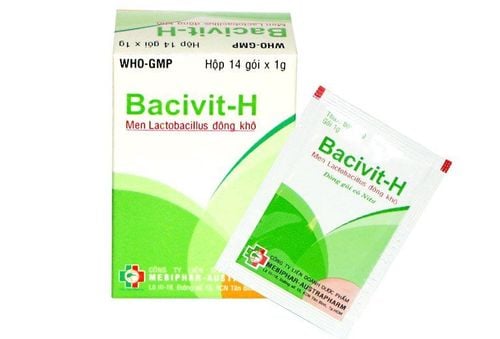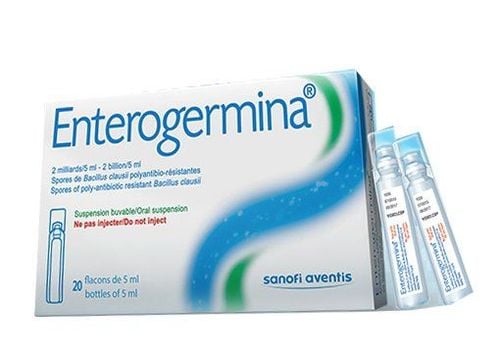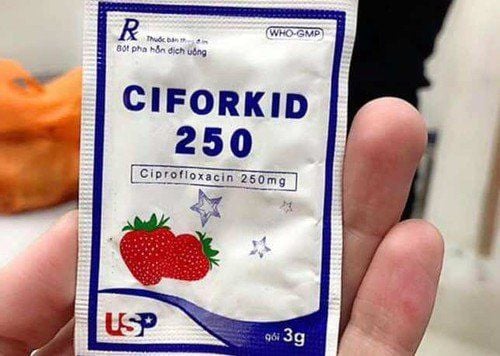This is an automatically translated article.
The article is professionally consulted with Master, Doctor Vu Quoc Anh - Department of Pediatrics - Neonatology, Vinmec Da Nang International General Hospital.
Intestinal dysbiosis is a common digestive disease. Symptoms of intestinal dysbiosis in children are like, how to treat, please refer to the article below.
1. What is intestinal dysbiosis in children?
Intestinal dysbacteriosis in children is quite common. It is caused by an imbalance of good and bad bacteria in the gut. In the normal state, inside the intestinal tract, beneficial bacteria account for 85% and the remaining 15% is harmful bacteria. Maintaining this ratio, the intestinal tract will keep a stable, efficient balance in the process of digesting food, including absorbing nutrients, eliminating toxic components, inhibiting and destroying harmful substances. intestinal bacteria. However, when the ratio of good bacteria and bad bacteria changes in the direction that the amount of good bacteria decreases and bad bacteria increases, it will cause intestinal infections.
2. Symptoms of intestinal dysbacteriosis
Symptoms of intestinal dysbiosis will manifest as follows:
Prolonged diarrhea, frothy stools with a sour smell Passing loose or raw stools May contain mucus or blood in the stool Some cases accompanied by bloating May mild fever. When children have severe symptoms of intestinal dysbiosis but are not treated promptly, they may experience severe dehydration, electrolyte disturbances, severe health failure, and prolonged malnutrition.
3. Consequences of prolonged intestinal dysbacteriosis in children
Intestinal dysbacteriosis causes disorders in the digestive process, reducing the ability to absorb nutrients, lacking nutrients. Since then, children will slow to gain weight, anorexia, malnutrition.
The percentage of beneficial bacteria in the intestinal tract is reduced, which means that the child's resistance is also reduced, prone to diseases related to the digestive system such as acute / chronic colitis, cholera, dysentery ,...
4. Treatment of intestinal dysbacteriosis
The treatment of children with intestinal dysbacteriosis is as follows:
Using microbial products: To treat intestinal dysbacteriosis in young children, probiotics such as Bacillus subtilis can be used. Microbial preparations will create a favorable environment for beneficial bacteria to grow, help increase resistance, stimulate the production of endogenous digestive enzymes, improve symptoms of digestive disorders such as abdominal pain, indigestion, constipation, diarrhea,... Improve diet: In addition to supplementing with microbial products, it is necessary to implement a reasonable diet for children. Do not give your baby a lot of sweets, if your baby has to eat formula, choose lactose-free milk (lactose free). For older children, their meals need to be full of nutrients, with many easily digestible foods such as pork, yogurt, pumpkin...
5. Restore intestinal function after dysbacteriosis
Consequences of intestinal dysbacteriosis in children, not only anorexia or poor nutritional absorption, prone to apple/liquid, but more importantly, reduced resistance. Because up to 70-80% of immune cells are made by gut bacteria.
Therefore, gastrointestinal rehabilitation after dysbacteriosis is essential to re-establish the intestinal microflora. Research in 2021 by Prof. Dr. Le Thi Hop (former Director of the National Institute of Nutrition) and colleagues on anorexia, digestive disorders, and nutritional deficiencies in children shows that: A combination of beneficial spores Bacillus subtilis bacteria with biologically active substances found in nature help to supplement spleen, enhance taste, digest food, and effectively improve digestive disorders. The combination of these substances also stimulates digestion, reduces diarrhea, constipation, helps children eat well, improves nutrient absorption for children.
6. How to prevent intestinal dysbacteriosis in children
In order to effectively prevent intestinal dysbacteriosis in infants and young children, parents need to give their children a reasonable diet, suitable for the baby's immature digestive system: as soon as possible, right after birth. Babies should be exclusively breastfed for the first 6 months, only introducing solid foods when they are 6 months old. Because babies under 6 months old do not have enough enzymes to digest foods other than breast milk and formula. This can be a risk to lead to dysbacteriosis and intestinal damage in children. A reasonable complementary diet, each meal should provide enough 4 groups of substances: Starch, protein, fat, fiber, vitamins and minerals. The ingredients for processing for children are always fresh, hygienic and well cooked. If your baby is drinking formula or powdered milk, it should be mixed according to the manufacturer's instructions on the package. Do not let children drink milk that has been mixed for more than 1 hour to prevent the milk from being denatured and no longer nutritious. Milk preparation tools and pacifiers are always washed and sterilized before and after use. Do not allow children to suck their thumbs or put toys or objects in their mouths. Wash your hands with soap or hand sanitizer before/after eating, feeding and after using the toilet. In case there are signs that the baby has intestinal bacteria, parents need to take the child to see a doctor. Note that do not arbitrarily buy medicine for children to take because it may make it worse, making it difficult for doctors to diagnose and treat.














